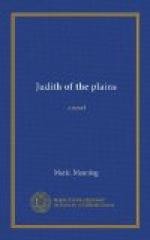He nodded his head wretchedly.
“’And the Lord took away the teeth of his enemy, so that he could neither bite nor talk,’” quoted Mrs. Yellett to the miserable man, who could make no reply.
“Wonder you wouldn’t see the foolishness o’ being a heathen and a infidel, and turn to the Lord! You ’ain’t got no teeth, and it takes your wife to herd you. ‘And the Lord multiplied the tribulations of his enemy.’ You got no more show standin’ up agin the Lord than an insect would have standin’ up agin me.”
She had Leander, at last, just where she wanted him. He was forced to listen, and he could make no reply. She alternately abused him for his lack of faith and urged him to repentance. Leander raged, gesticulated, turned his back on her, mouthed, and finally put his fingers in his ears. But nothing stemmed the tide of Mrs. Yellett’s eloquence; it was as inexhaustible and as remorseless as the cloud-burst.
It continued bitterly cold, even after the rain had stopped falling, and the heap of sodden bedclothes furnished no protection against the chilling dampness. It was growing dark; there was no red in the sunset, only a streak of vivid orange along the horizon, chill and clear as the empty, soulless flame of burning paper. There were no deep, glowing coals, no amethystine opalescence, fading into gold and violet. All was cold and subdued, and the scrub pines on the mountain-tops stood out sharply against this cold background like an etching on yellow paper.
Mrs. Yellett’s self-inspired scriptural maxims were discontinued after a while, either because she could think of no more, or because the rain-soaked, shivering, chattering object towards which they were directed was too abject to inspire further efforts. Leander huddled on the barrel that was farthest from Mrs. Yellett, and wrapped himself in the soaked red bedquilt. The dye smeared his face till he looked like an Indian brave ready for battle, but there was no further suggestion of the fighting red man in the utter desolation of his attitude. Mary Carmichael, on her barrel, shivered with grim patience and longed for a cup of tea. Only Mrs. Yellett gave no sign of anxiety or discomfort; she drove along, sometimes whistling, sometimes swearing, erect as an Indian, and to all appearances as oblivious of cold and wet as if she were in her own home.
The gathering darkness into which the horses were plunging was mysterious and appalling. Objects stood out enormously magnified, or distorted grotesquely, in the uncertain light. It was like penetrating into the real Inferno, like stumbling across the inspiration of Dante in all its sinister splendor. It was the Inferno of his dream rather than the Inferno of his poem; it had the ghastly reality of the unreal.
“It wouldn’t surprise me if we had a smash-up in Clear Creek,” said Mrs. Yellett, just by way of adding her quota of cheerful speculation. She ducked her head and whispered in Mary’s ear:




